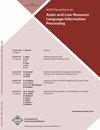低资源神经机器翻译中的多粒度知识共享
IF 2
4区 计算机科学
Q3 COMPUTER SCIENCE, ARTIFICIAL INTELLIGENCE
ACM Transactions on Asian and Low-Resource Language Information Processing
Pub Date : 2024-01-09
DOI:10.1145/3639930
引用次数: 0
摘要
随着深度学习方法的快速发展,神经机器翻译(NMT)近年来受到越来越多的关注。然而,双语资源的缺乏严重降低了低资源 NMT 模型的性能。为了克服这一问题,一些研究致力于将知识从高资源语言对转移到低资源语言对。然而,这些方法通常只关注单一粒度的语言,而对 NMT 中不同粒度语言之间的参数共享问题研究不多。在本文中,我们建议通过引入多粒度知识(如词、短语和句子)来改进低资源 NMT 中的参数共享。这些知识可以是单语的,也可以是双语的。我们基于多任务学习(MTL)框架为低资源 NMT 建立了知识共享模型,并为低资源 NMT 选择了语法分析、跨语言命名实体识别和自然语言生成等三个辅助任务。实验结果表明,在多个低资源语言对上,所提出的方法始终优于六个强大的基线系统。本文章由计算机程序翻译,如有差异,请以英文原文为准。
Multi-Granularity Knowledge Sharing in Low-Resource Neural Machine Translation
As the rapid development of deep learning methods, neural machine translation (NMT) has attracted more and more attention in recent years. However, lack of bilingual resources decreases the performance of the low-resource NMT model seriously. To overcome this problem, several studies put their efforts on knowledge transfer from high-resource language pairs to low-resource language pairs. However, these methods usually focus on one single granularity of language and the parameter sharing among different granularities in NMT is not well studied. In this paper, we propose to improve the parameter sharing in low-resource NMT by introducing multi-granularity knowledge such as word, phrase and sentence. This knowledge can be monolingual and bilingual. We build the knowledge sharing model for low-resource NMT based on a multi-task learning (MTL) framework, three auxiliary tasks such as syntax parsing, cross-lingual named entity recognition and natural language generation are selected for the low-resource NMT. Experimental results show that the proposed method consistently outperforms six strong baseline systems on several low-resource language pairs.
求助全文
通过发布文献求助,成功后即可免费获取论文全文。
去求助
来源期刊

ACM Transactions on Asian and Low-Resource Language Information Processing
Computer Science-General Computer Science
CiteScore
3.60
自引率
15.00%
发文量
241
期刊介绍:
The ACM Transactions on Asian and Low-Resource Language Information Processing (TALLIP) publishes high quality original archival papers and technical notes in the areas of computation and processing of information in Asian languages, low-resource languages of Africa, Australasia, Oceania and the Americas, as well as related disciplines. The subject areas covered by TALLIP include, but are not limited to:
-Computational Linguistics: including computational phonology, computational morphology, computational syntax (e.g. parsing), computational semantics, computational pragmatics, etc.
-Linguistic Resources: including computational lexicography, terminology, electronic dictionaries, cross-lingual dictionaries, electronic thesauri, etc.
-Hardware and software algorithms and tools for Asian or low-resource language processing, e.g., handwritten character recognition.
-Information Understanding: including text understanding, speech understanding, character recognition, discourse processing, dialogue systems, etc.
-Machine Translation involving Asian or low-resource languages.
-Information Retrieval: including natural language processing (NLP) for concept-based indexing, natural language query interfaces, semantic relevance judgments, etc.
-Information Extraction and Filtering: including automatic abstraction, user profiling, etc.
-Speech processing: including text-to-speech synthesis and automatic speech recognition.
-Multimedia Asian Information Processing: including speech, image, video, image/text translation, etc.
-Cross-lingual information processing involving Asian or low-resource languages.
-Papers that deal in theory, systems design, evaluation and applications in the aforesaid subjects are appropriate for TALLIP. Emphasis will be placed on the originality and the practical significance of the reported research.
 求助内容:
求助内容: 应助结果提醒方式:
应助结果提醒方式:


